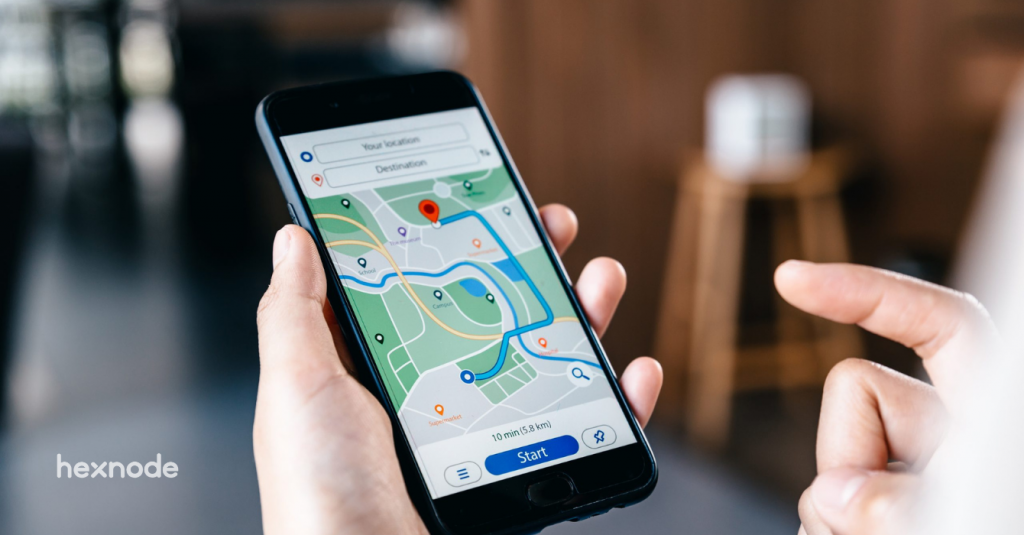Lexie! Can you please check how far the Uber Eats guy is? I’m starving!
Yup, hunger pangs sure can be irritating. But at least watching the miniature Uber Eats guy speed his way to your address on your phone’s map takes the edge away, right?
Claire, I’m dropping my live location in the chat lest I get kidnapped by my cab guy…
Now, that’s scary! At least Claire’s got Becca’s back. Claire can keep track of Becca’s geolocation until she reaches her destination.
Where’s my cab at? Let me check my phone. Oh! There it is, just down the block.
Ah! The absolute relief that sets in when your phone’s map (from within your app 😉) confirms that your cab’s just around the corner is quite palpable.
Well, well, well! There really is no doubt that sharing and tracking location data, whether our own or somebody else’s, has quickly become the norm in our day-to-day lives. Most apps, from food delivery to pick-up and drop services, use geolocation data. But, with great innovation (geolocation data) comes great responsibility, especially towards sensitive user info.
Geolocation and data privacy laws
Today, any sort of data is worth a lot of money. So, obviously, sensitive user information (geolocation data and such) is a goldmine in comparison. And so, you must handle location data with proper care. Not just individually, where you try to safeguard personal data, but on a global level. And this, ladies and gentlemen, is where geolocation tracking and data privacy rules meet.
Understanding the legal landscape of geolocation data
As we’ve already seen, handling geolocation data is a global concern. And so it’s no surprise that various countries and regions have established complex regulations governing its use. Here’s a snapshot of some international regulations shaping the management and protection of location data.
General Data Protection Regulation (GDPR)
Enforced by the European Union (EU), GDPR sets strict guidelines for collecting, processing, and storing personal data, including location information. The core of the law focuses on user consent and data security.
Key features:
- Unique feature: GDPR applies to all EU member states and also to companies outside the EU if they offer goods or services to EU residents or monitor their behavior.
- Strict fines: GDPR can impose hefty fines on companies that don’t follow the rules, up to 4% of their global revenue.
- User consent: Requires clear and affirmative consent for data processing activities, including the collection and use of location data.
- Data security: Mandates measures to ensure the security and integrity of personal data, including encryption and data breach notification.
European Union’s ePrivacy Directive
This directive complements GDPR by specifically addressing electronic communications. It includes geolocation data obtained through cookies and other tracking technologies and requires user consent for such data processing.
Key features:
- Unique feature: As mentioned, the ePrivacy Directive specifically targets electronic communications, such as emails and messaging apps. It provides additional protection for users’ privacy in online interactions.
- Online tracking: Regulates the use of cookies and other tracking technologies to collect data, including location information, from users’ devices.
- Consent requirements: Requires websites and apps to obtain user consent before setting cookies or tracking user activity, promoting transparency and user control.
California Consumer Privacy Act (CCPA)
California’s landmark privacy law grants state consumers enhanced control over their personal information, including location data, by requiring businesses to disclose data practices and provide opt-out mechanisms.
Key features:
- Unique feature: CCPA applies specifically to businesses that meet certain criteria, such as having annual gross revenues over $25 million or collecting personal information from over 50,000 California residents.
- Consumer rights: Gives California residents the rights to access, correct, delete, and opt out of the sale of their personal information, including location data.
- Data disclosure: Requires businesses to disclose data collection and sharing practices, providing consumers with transparency.
- Broad definition: CCPA defines personal information broadly. It includes identifiers such as IP addresses and browsing history, providing comprehensive protection to consumers.

Featured resource
Hexnode for data security: Protecting your business data with Hexnode
Check out how to weave in Hexnode to improve the data security infrastructure of your organization.
Download WhitepaperPersonal Information Protection Law (PIPL) in China
China’s PIPL regulates the collection and use of personal information, including location data, emphasizing data minimization, purpose limitation, and user consent.
Key features:
- Unique feature: PIPL applies to organizations and individuals handling personal information within China’s borders, regardless of their nationality or location. It ensures comprehensive protection of personal data in China. Also, PIPL imposes restrictions on the cross-border transfer of personal information. It requires companies to undergo security assessments or obtain approval from regulatory authorities before transferring data outside China.
- Data minimization: Mandates companies to collect only necessary personal information, including location data, for specific and legitimate purposes.
- User consent: Mandates obtaining clear and informed consent from individuals before processing their personal information, ensuring user control over data.
- Data localization: Encourages the localization of personal data storage and processing within China’s borders to enhance data security and regulatory oversight.
Personal Data Protection Bill (PDPB) in India
India’s recently passed (9th Aug’23) PDPB aims to regulate the processing of personal data, including location information, by establishing principles of consent, data localization, and individual rights. It emphasizes the importance of keeping data within India’s borders and giving users control over their information.
Key Features:
- Unique feature: PDPB proposes the establishment of a Data Protection Authority of India (DPAI) to oversee compliance with the law, investigate data breaches, and impose penalties on non-compliant entities, enhancing regulatory oversight and enforcement mechanisms.
- Consent requirements: Requires companies to obtain explicit consent from individuals before processing their data, including location information, for specified purposes.
- Data localization: Proposes storing a copy of personal data within India’s borders, subject to certain exemptions, to ensure data sovereignty and facilitate regulatory oversight.
- Individual rights: Grants individuals the rights to access, correct, and delete their data, including location information, and provides mechanisms for enforcing these rights.
United Kingdom’s Data Protection Act (UK DPA)
Post-Brexit, the UK has its own data protection framework, largely aligned with GDPR, providing similar protections for location data and emphasizing transparency and accountability.
Key Features:
- Unique feature: UK DPA provides mechanisms for the lawful transfer of personal data between the UK and other countries, including adequacy decisions and standard contractual clauses, ensuring continued data flows post-Brexit.
- Alignment with GDPR: Maintains consistency with GDPR principles, such as transparency, accountability, and data subject rights, ensuring similar protections for location data.
- Data transfer mechanisms: Provides mechanisms for the lawful transfer of personal data between the UK and other countries, including adequacy decisions and standard contractual clauses.
- Regulatory oversight: Empowers the UK Information Commissioner’s Office (ICO) to enforce data protection laws and impose sanctions on organizations that violate data protection regulations.
LGPD in Brazil (Lei Geral de Proteção de Dados)
Brazil’s LGPD governs the processing of personal data, including location data, with principles akin to GDPR, such as data subject rights and data protection obligations for businesses.
Key features:
- Unique feature: LGPD grants individuals rights to access, rectify, and delete their data, including location information, and provides mechanisms for lodging complaints with regulatory authorities, ensuring robust individual rights protection.
- Administrative sanctions: LGPD empowers the Brazilian National Data Protection Authority (ANPD) to oversee compliance with the law, impose administrative sanctions on non-compliant entities, and investigate data protection violations, enhancing regulatory oversight and enforcement mechanisms.
- Accountability measures: Imposes obligations on organizations to implement data protection measures, such as data security safeguards and data protection impact assessments, to ensure compliance with the law.
Privacy Act – Australia
Australia’s Privacy Act regulates the handling of personal information, including location data, by organizations, ensuring compliance with privacy principles and notification of data breaches.
Key features:
- Unique feature: The Privacy Act requires organizations to notify individuals and the Office of the Australian Information Commissioner (OAIC) of eligible data breaches involving personal information, including location data, ensuring timely and transparent reporting of data breaches.
- Privacy principles: Sets out Australian Privacy Principles (APPs) that govern the collection, use, and disclosure of personal information, including location data, by organizations.
- Small business exemption: The Privacy Act exempts small businesses with an annual turnover of less than $3 million from certain obligations, such as data breach notification requirements, providing flexibility for smaller organizations.
- Credit reporting: The Privacy Act includes provisions for credit reporting, regulating the handling of credit-related personal information by credit reporting bodies, credit providers, and other entities, and enhancing consumer protection in credit transactions.
A unified global approach…
Understanding the diverse legal frameworks and requirements is essential for businesses operating in the global landscape. On that note, challenges such as cross-border data transfers, diverse regulatory requirements, and data localization mandates underscore the need for a unified global approach to compliance efforts.
A unified global approach offers several benefits:
- Consistency and Efficiency: A harmonized approach streamlines compliance efforts across regions, reducing complexity and minimizing operational overhead.
- Enhanced user trust: By adhering to high privacy standards globally, businesses can build trust with users, demonstrating commitment to protecting their privacy rights.
- Future-proofing against emerging regulations: Anticipating and adapting to evolving privacy regulations ensures resilience against legal uncertainties and potential compliance gaps.
- Competitive advantage: Proactively addressing privacy concerns and demonstrating compliance can differentiate businesses in the marketplace, fostering customer loyalty and brand reputation.
Essentially, multinational corporations that successfully navigate global privacy regulations often adopt strategies such as implementing a unified global privacy policy, employing advanced data encryption methods, and adapting to local regulations while prioritizing user privacy. Businesses embracing a user-centric approach empower users with greater control over their location data, regardless of geographical boundaries, thereby fostering transparency, trust, and compliance. Here’s a look at a few famous names.
- Unified global privacy policy: Google has implemented a unified global privacy policy that aligns with various international regulations, including GDPR and CCPA. This policy ensures consistent data protection practices across its services, regardless of users’ locations.
- Advanced data encryption: Google employs advanced data encryption methods to secure location data and other personal information. This ensures that user data remains protected, even in transit or storage, complying with stringent privacy requirements.
- Adaptation to local regulations: Google adapts its services to comply with local privacy regulations without compromising user privacy. For example, it offers granular privacy controls, allowing users to customize their data-sharing preferences based on their regional privacy preferences.
Apple
- User-centric privacy approach: Apple has adopted a user-centric approach to privacy, empowering users with greater control over their location data and other personal information. It provides features such as App Tracking Transparency and Location Services controls, allowing users to manage their privacy settings easily.
- Stringent data protection measures: Apple employs stringent data protection measures, including end-to-end encryption and on-device processing. These measures safeguard location data and maintain user privacy. This ensures that user data remains secure and private, even from Apple itself.
- Compliance with global regulations: Apple ensures compliance with global privacy regulations by incorporating privacy-by-design principles into its products and services. This proactive approach to privacy enables Apple to meet regulatory requirements while prioritizing user privacy and security.
Best practices for geolocation data management
Okay, so now, what are some tips or best practices for effective geolocation data management? Well, here we are…
- Explicit user consent:
- Tailoring consent mechanisms: Customize consent interfaces to ensure clarity and ease of use for users.
- Communication: Communicate the purpose and benefits of location tracking to users, fostering transparency and trust.
- Regulatory alignment:
- Stay abreast of regulations: Stay up-to-date with data protection laws like GDPR and CCPA, aligning consent practices accordingly.
- Customization for regions: Adapt consent practices to regional legal frameworks, ensuring compliance with local laws.
- Data minimization:
- Collecting essential data: Minimize data collection by gathering only essential information necessary for business purposes while considering user privacy concerns.
- Balancing needs: Strike a balance between business needs and user privacy, prioritizing data minimization to reduce privacy risks.
- Privacy impact assessments (PIAs):
- Conduct assessments: Perform privacy impact assessments (PIAs) to evaluate the impact of location data collection on user privacy systematically.
- Risk mitigation: Identify and mitigate risks associated with data collection, storage, and processing. Try to involve legal and privacy teams for comprehensive assessments.
- Security measures:
- Encryption: Implement encryption methods to secure the storage and transmission of location data, ensuring protection against unauthorized access.
- Anonymization: Utilize anonymization techniques to safeguard user identities, enhancing privacy protection while still enabling data analysis and insights.
- Integration with UEM (Unified Endpoint Management):
- Effective management: Consider implementing a Unified Endpoint Management (UEM) solution for comprehensive location data management.
- Centralized control: UEM offers centralized control over devices and data. This allows businesses to efficiently manage location tracking settings and ensure compliance with privacy regulations.
Taking control of your geolocation data
As mentioned above, bringing in a UEM to reinforce your security infrastructure is, indeed, a solid idea. But, one of the most common features of a comprehensive UEM solution is its ability to locate lost/stolen devices. Also, with the constant tracking of the devices, won’t it clash with our original objective of managing location data? Well, not really! With a best-in-class UEM solution like Hexnode, you can now rest easy. Say goodbye to worrying about the hassles of location data management!
Yup, you read that right! Hexnode’s ‘Delete Location History‘ functionality puts control firmly back in the hands of the admins. It empowers them to dictate the retention duration of location data. Aligned with global privacy standards, this feature offers organizations a seamless solution to strike the perfect balance between operational necessities and user privacy expectations. Here’s why the feature is a treat.
- Automated data management: With Hexnode’s ‘Delete Location History’ feature, manual data management headaches become a thing of the past. Enjoy automated control over how long location data is retained, ensuring a streamlined and efficient process.
- Enhanced compliance: Stay ahead of the curve with enhanced compliance capabilities. Hexnode’s feature aligns effortlessly with global privacy standards, providing peace of mind and ensuring your organization remains on the right side of regulations.
Nice, isn’t it?
And that’s a wrap…
At the end of the day, navigating the complexities of geo-privacy laws requires a delicate balance between leveraging the benefits of location data and safeguarding user privacy. As organizations strive to meet the demands of these laws without hindering technological advancements, Hexnode stands as a trusted ally. Hexnode’s provision to delete location history goes beyond mere compliance; it represents a proactive approach toward enhancing user control and transparency. And so, choose Hexnode for a journey where innovation harmonizes with legal adherence, and privacy is not just protected but prioritized.
Try Hexnode for free
Sign up for a 14-day free trial to know how Hexnode can help your organization ensure enterprise data security through device management.
Join now!





